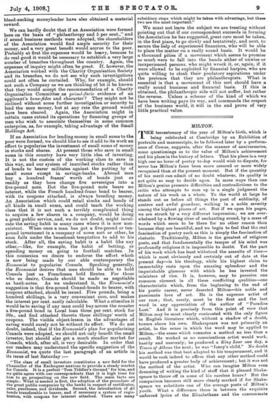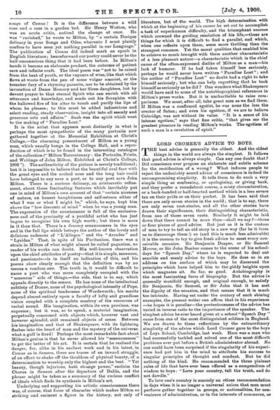MILTON.
THE tercentenary of the year of Milton's birth, which is being celebrated at Cambridge by an Exhibition of portraits and manuscripts, to be followed later by a perform- ance of Ccrmv.s, suggests, after the manner of anniversaries, some questionings as to the value of Milton's achievement and his place in the history of letters. That his place is a very high one no lover of poetry to-day would wish to dispute, for never has Milton's fame been more assured or more widely recognised than at the present moment. But if the quantity of his merit can admit of no doubt whatever, its quality is not quite so easy to decide upon. In more ways than one Milton's genius presents difficulties and contradictions to the critic who attempts to sum up in a single judgment the nature of his work as a whole. To the world at large he stands out as before all things the poet of sublimity, of austere and awful grandeur, walking in a noble severity among the highest places of art. But if we open his pages, we are struck by a very different impression; we are over- whelmed by a flowing river of enchanting sound, by a mass of words which seem to be there for no other reason than because they are beautiful, and we begin to feel that th3 real fascination of poetry such as this is simply the fascination of rhetoric. Traditionally, Milton is the greatest of religious poets, and that fundamentally the temper of his mind was profoundly religious it is impossible to doubt. Yet the part of his work which has least withstood the assaults of time— which is most obviously and certainly out of date at the present day—is his theology, while his highest claim to immortality rests upon the amazing splendour and the imperishable glamour with which he has invested the ministers of vice. It is, however, easy to perceive one common element in all these conflicting qualities—one characteristic which, from the beginning to the end of his poetic career, never deserted Milton—his noble and passionate love of art. He is the supreme artist of our race ; that, surely, must be the first and the last word in any appreciation of the author of "Paradise Lost." And it is precisely from this point of view that Milton may be most clearly contrasted with the only figure in English literature which, without a. shadow of a doubt, towers above his own. Shakespeare was not primarily an artist, in the sense in which the word may be applied to Milton,—the sense which connotes a method no less than a result. He worked as no conscientious artist would work, hastily and unevenly; he produced a Sing Lear one day, a Tinton of Athens the next; he was "fancy's child." No doubt his method was that best adapted to his temperament, and it would be rash indeed to affirm that any other method could have produced a greater body of achievement ; but it was not the method of the artist. Who can imagine Milton even dreaming of writing the kind of stuff that it pleased Shake- speare to throw off in some of his careless hours ? But the comparison becomes still more clearly marked if for Shake- speare we substitute one of the average poets of Milton's youth. What a difference there is between the exquisite unforced lyrics of the Elizabethans and the consummate
songs of Comas ! It is the difference between a wild rose and a rose in a garden bed. Sir Henry Wotton, who was an acute critic, noticed the change at once. He was "ravished," he wrote to Milton, by "a certain Dorique delicacy in your Songs and Odes, wherunto I must plainly confess to have seen yet nothing parallel in our Language." The publication of Comm did indeed mark an epoch in English literature; henceforward our poetry could never be the half-unconscious thing that it had been before. In Milton's hands it became an elaborate product, the outcome of patient care and infinite craft. The ideal poem was "not to be raised from the heat of youth, or the vapours of wine, like that which flows at waste from the pen of some vulgar amorist, or the trencher fury of a rhyming parasite, nor to be obtained by the invocation of Dame Memory and her Siren daughters, but by devout prayer to that eternal Spirit who can enrich with all utterance and knowledge, and sends out his Seraphim with the hallowed fire of his altar to touch and purify the lips of whom he pleases ; to this must be added industrious and select reading, steady observation, insight into all seemly and generous arts and affairs." Such was the spirit which went to the making of "Paradise Lost."
It is the artist that appears most distinctly in what is perhaps the most sympathetic of the many portraits now gathered together at the Memorial Exhibition at Christ's College,—the charming presentment of Milton as a young man, which usually hangs in the College Hall, and a repro- duction of which is to be found in the interesting catalogue of the collection (" Milton Tercentenary : the Portraits, Prints, and Writings of John Milton, Exhibited at Christ's College, 1908 "). The authenticity of the picture is merely traditional ; but it is impossible to believe that the beautiful oval face with the great eyes and the arched nose and the long hair could have belonged to any save a poet, or to any poet save John Milton. There is a curious delicacy, an aristocratic refine- ment, about these fascinating features which inevitably put one in mind of Milton's own account of that "certain niceness of nature, an honest haughtiness and self-esteem either of what I was or what I might be," which, be says, kept him above the "low descentc of mind" when he was a young man. The expression of the countenance is full of the exclusive- ness and of the preciosity of a youthful artist who has just begun to recognise his own high worth ; but there is more in it than that. There is a dreamy sensuousness in the eyes and in the full lips which betrays the author of the lovely and delicious cadences of " L'Allegro " and the "Arcades" and " Lycidas." That, in spite of his Puritanism, there was a strain in Milton of what might almost be called paganism, no reader of his works can doubt. His well-known observation upon the chief attributes of poetry—that it is simple, sensuous, and passionate—is in itself an indication of this, and his poems show clearly enough that the definition was by no means a random one. The truth is, it would be difficult to name a poet who was more completely occupied with the "sensuous" side of things,—the side, that is to say, which appeals directly to the senses. He has none of the intellectual subtlety of Donne, none of the psychological intensity of Pope, none of the spiritual tenderness of Wordsworth; his merits depend almost entirely upon a faculty of lofty and grandiose vision coupled with a complete mastery of the resources of verbal sound. His imagination, within its own province, was supreme ; but it was, so to speak, a material imagination, perpetually concerned with objects which, however vast and however splendid, still remained objects of sense, Between his imagination and that of Shakespeare, with its lightning flashes into the heart of man and the mystery of the universe, what a gulf is fixed! Perhaps the most remarkable fact about Milton's genius is that he never allowed his "sensuousness" to get the better of his art. It is certain that he realised the danger, for, alike in his earliest work and in his latest, in Comus as in Samson, there are traces of an inward struggle, of an effort to shake off the thraldom of physical beauty, of a determination to worship only the highest and the best. "Yet beauty, though injurious, bath strange power," exclaim the Chorus in Samson after the departure of Dalila, and the phrase might be taken as a summary of the curious conflict of ideals which finds its synthesis in Milton's art.
Underlying and supporting his artistic consciousness there was, of course, that force of character which makes Milton so striking and eminent a figure in the history, not only of
literature, but of the world. The high determination with which at the beginning of his career he set out to accomplish a task of superhuman difficulty, and the triumphant success which crowned the guiding resolution of his life,—these are things for which it is difficult to find a parallel, and which, when one reflects upon them, seem more thrilling than the strangest romance. Yet the moral qualities that enabled him to achieve so much brought with them another characteristic of a less pleasant nature—a characteristic which is the chief cause of the often-expressed dislike of Milton as a man—his lack of humour. If he had taken himself less seriously, perhaps he would never have written "Paradise Lost" ; and the author of "Paradise Lost" no doubt had a right to take himself seriously; but who can hello regretting that he took himself as seriously as he did ? One wonders what Shakespeare would have said to some of the autobiographical references in Milton's prose works. But it is uncharitable to raise com- parisons. We must, after all, take great men as we find them. If Milton was a confirmed egotist, he was none the less the creator of Satan; and even his egotism, if we are to believe Coleridge, was not without its value. "It is a sense of his intense egotism," says that fine critic, "that gives me the greatest pleasure in reading Milton's works. The egotism of such a man is a revelation of spirit."



















































 Previous page
Previous page